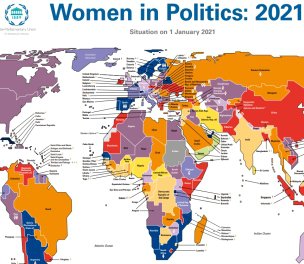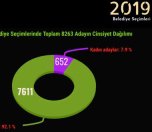Click to read the article in Turkish
Prepared by the United Nations (UN) Women and Inter-Parliamentary Union (IPU) since 2005, the "Women in Politics 2020" Map has been released.
The map has shown that while women's representation in political decision-making continues to increase, albeit at a dragging pace, three-quarters of parliamentary seats are still held by men around the world.
According to the "Women in Politics 2020" Map, 24.9 percent of all parliamentarians around the world are women. While Rwanda, Cuba and Bolivia have ranked on the top of this category, Turkey has ranked 122nd among 193 countries, marking a degrade of two rankings in comparison with the previous year. In 2017, 14.9 percent of MPs in Turkey were women and the country ranked 132nd in the category of women in parliament.
As for the ranking in women in ministerial positions, Turkey has ranked 138th among 190 countries with 11.8 percent of women ministers.
Highlights from around the world
20 countries headed by womenThe map prepared by the UN Women and IPU has presented global rankings for women in executive, government and parliamentary positions as of January 1, 2020. Fewer than one-tenth of countries are led by a woman today. Twenty countries now have women Heads of State and Government - up from 19 countries in 2019. As of January 1, 2020, 6.6 percent of elected Heads of State are women (10 out of 152) and 6.2 percent of Heads of Government (12 out of 193); in two of these countries (Bolivia and Switzerland), the Head of State and Government is the same. Today, more than half of women Heads of State and Government are in Europe. Nearly all governments in the Nordic countries (Denmark, Finland, Iceland, Norway) are headed by a woman, with Sweden being the exception. Three women Heads of State or Government are serving in the Americas, which is half the number that were serving in 2015. Three women are serving as Heads of State or Government in Asia (Bangladesh, Nepal, Singapore), one in Africa (Ethiopia) and one in the Pacific (New Zealand). No countries in the Arab States region have had a woman Head of State or Government. |
Proportion of women ministers: 21.3 percentAccording to the map, the proportion of women ministers is at an all-time high at 21.3 percent (851 out of 4003), which is 7.1 percentage points higher than in 2005, when only 14.2 percent of ministers were women. Despite some shifts in recent years, women ministers are still most likely to oversee family and social affairs, followed closely by environment and energy portfolios. The "Women in Politics" map has also shown that women now account for 50 percent or more ministerial positions in 14 countries, up from nine in 2019. An additional 16 countries have more than 40 percent women ministers. The 14 countries with 50 percent or more women in cabinet:
|
An increase in the number of women speakers of parliamentAccording to the UN Women-IPU map, the share of women parliamentary speakers around the world is 20.5 percent in 2020 (57 out of 278 presiding officer posts across 192 countries). This is double the number of women speakers 25 years ago. While only the Pacific does not currently have a woman presiding officer of parliament, the share of women deputy speakers has also decreased by 3 percentage points to 25.3 percent compared to 2019. In 2019, 7 countries appointed women speakers of parliament for the first time (Andorra, Belarus, Democratic Republic of the Congo, Indonesia, Kazakhstan, Malawi and Togo). |
Call from the UN Women
Within this frame, UN Women Executive Director Phumzile Mlambo-Ngcuka has made the following call to the world:
We have created a world where women are squeezed into just 25 per cent of the space—in parliaments and in other critical decision-making spaces.Yet we know that more women in high-level political decision-making positions leads to policies that benefit the whole of society. Women and girls are radically impatient for change and we are calling on leaders and parliamentarians to take the necessary actions to ensure their voices are heard and their priorities reflected.
(EMK/SD)








